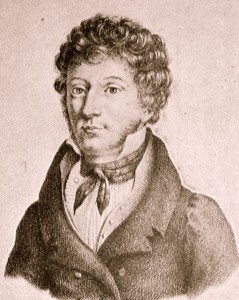Apart from the occasional handful of popular nocturnes peppered in an otherwise ‘traditional’ concert program, it’s a very rare occurrence to see a piece by John Field offered up to the audience at a piano recital, let alone any other type of concert. On the surface, it’s a no-brainer: Field’s primary claim to fame as being the ‘father of the nocturne’, the first to coin the term in reference to the short night-inspired character pieces and consequently a huge influence on Chopin and other later nocturne composers, means it’s only natural that these pieces receive the bulk of the small amount of attention cast in his direction. But to dismiss John Field as a one-trick pony seems a little narrow-minded given that the composer’s musical output during his lifetime was broader than just a handful of character pieces, and his influence more important that it is generally given credit for.
Field, born in Dublin in 1782, was somewhat of a child prodigy with a great aptitude for music in his early childhood, and by the age of eleven, the already accomplished pianist was apprenticed to Clementi to work in his piano workshop in London. He continued performing and gaining a reputation for his virtuosic skill as a pianist while there, in the meantime helping in the workshop to build and maintain instruments. He was also required to help sell the pianos by demonstrating for the public in the workshop, and it was during this time spent with Clementi that his first major compositions appeared: a piano concerto and three sonatas, the sonatas consequently published by Clementi himself in 1801.
The majority of his compositions, understandably given his disposition for performing on the instrument, are works including a piano as the main focus; there are indeed chamber works for strings and a small quantity of songs, but the high proportion of his compositions are pieces including a piano, either solo, duo or with orchestra. His most substantial contribution to the piano repertoire (apart from the nocturnes) is a collection of seven concertos, the previously mentioned first written in 1799, the last in 1822. On listening to the first (see above), Classicism shines through with an air of late Mozart/early Beethoven, but by the seventh concerto (see below), the style has matured and there’s a definite Romanticism in flavour not completely dissimilar to Chopin – compare with the Chopin First Piano Concerto, for example. The stately first movements (coincidently both in 3/4) certainly share similarities in style, and the rondos at the end of each of the concertos are equally sprightly. Both concertos are also imbued with a Romantic lyricism not yet entirely devoid of Classical structure, and since we’re already well aware of the influence Field had on Chopin through his adoption of the nocturne form, it can be deduced that Chopin picked up a few other tricks from the composer, whose work he clearly had an admiration for.
So, having established that Field was indeed an important influence on Chopin (possibly too much of an influence, given Field’s own reported distaste at the similarities between his Romance and Chopin’s later Nocturne Op. 9 No.2), were there other composers influenced by his life, works or performances? Certainly, Brahms was said to have owned some of Field’s music, but the influence seems little more extensive than that. However, there is an interesting connection with Mendelssohn to note: a shared teacher, Ludwig Berger, leads a direct line from Field to Mendelssohn, and there are some works which would suggest an influence from the former to the latter. Certainly, the majority of Field’s rondos (noteworthy are Rondo on ‘Come Again’ H.53 and, to a leser extent, Rondo in Ab, H. 18) would not be out of place in a book of Lieder Ohne Worte, and it can’t help but be ruminated that perhaps the older composer had an influence in the compositional style of the younger; whether indirectly or directly, it is hard to ascertain.
So with a position of influence woven into the fabric of the early 19th century music scene, why is Field not given more credit nowadays? His work was original for the time, imbued with a sense of great lyricism and style acting as a precursor to the Romantic era, and given his influence on various composers who are today better remembered, it most certainly seems that he was not unrecognised for his talents at the time. To me, it appears that Field’s legacy has not lasted as well as it should have simply because there have not been many attempts at a revival: while Busoni planned to showcase a new way to play Field in the 1920s before his death, even these programmes were saturated with nocturnes, and no-one else has dared touch the bulk of Field’s repertoire. Just as the Schubert Piano Sonatas were not given any attention before their 21st century revival, it seems that Field is destined to suffer the fate of being completely unrecognised until some brave soul sees fit to drag his legacy onto the concert platform; let us just hope it is not another two centuries until he finally gets the audience and wider share of attention that he deserves.





Discussion
No comments for “John Field: One-Trick Pony or Original Precursor to the Romantics?”